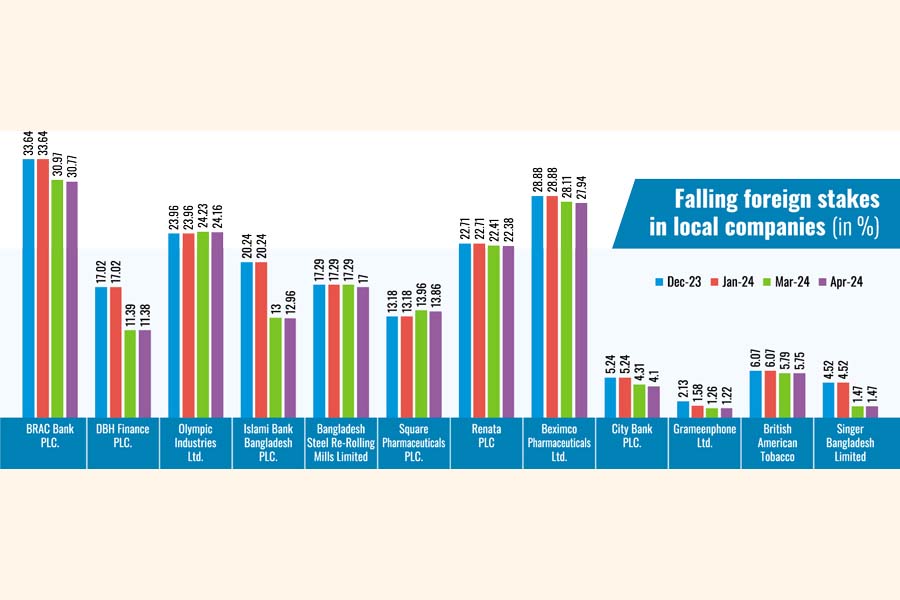
Published :
Updated :

Foreign stakes in listed securities have continued to fall as overseas investors dumped their holdings, having lost faith in the market and become worried over the sharp devaluation of the local currency against the dollar.
The market index hovered around 6,300 points for 18 months until January this year, thanks to the securities regulator's bar on trade in shares at prices lower than the floor price set for every stock.
Since the withdrawal of floor prices beginning in January, the Dhaka bourse lost more than 15 per cent or 965 points and plunged to a more than three-year low of 5,371 points on Tuesday. During the time, the market value of stocks shed Tk 986 billion as major stocks saw massive selloffs.
 All along foreign investors were leaving the market, accelerating the weakening of it.
All along foreign investors were leaving the market, accelerating the weakening of it.
Amid a lower participation of foreign investors, overall foreign transactions already slumped 48 per cent year-on-year to Tk 21.67 billion in 2023. That falling trend has continued and intensified when the regulator lifted the price restriction enabling investors to sell shares at lower prices.
Market experts say both local and foreign investors seek to get rid of their holdings that had remained stuck on the floor. The absence of price discovery of a large number of stocks for so long acted as a catalyst for the quick outflow of funds.
The imposition of floor prices discouraged foreign investors to increase their exposure to the Bangladesh market, said Mir Ariful Islam, managing director of Sandhani Asset Management.
Foreign shareholding in Grameenphone, the largest stock in consideration of the market capitalisation, was 2.13 per cent in January this year, which fell to 1.22 per cent in April this year.
BAT Bangladesh, the third largest stock, experienced a similar trend. Its foreign stake was reduced from 6.39 per cent in January to 5.75 per cent in April this year.
When it comes to investing in stocks in Bangladesh, foreigners are mostly interested in multinational companies. The companies are well governed and have successfully secured a profit growth even in adverse business environments.
But a consistent business performance seems to have not been enough to make foreign investors stay with the multinational companies when faith is at stake in the market and policies that govern it.
The investors simply want to stay away from the market, say market experts.
Md. Ashequr Rahman, managing director of Midway Securities, said foreign investors always prefer a highly liquid market.
"The artificial price mechanism made the whole market illiquid", he said, hurting foreign investors' confidence.
Meanwhile, Morgan Stanley Capital International (MSCI), a global investment research firm, last year decided to bring no change in measuring Bangladeshi stocks' performance in its frontier markets index due to "the deterioration of liquidity" in the equity market.
MSCI created a special circumstance as the price discovery was not happening correctly because of the imposition of floor price.
The situation worsened because of the massive depreciation of the local currency against the dollar.
Moreover, rising interest rates and lower profitability of most listed companies due to higher import costs create an unfavourable climate for fresh foreign investments in stocks, said Mr Ariful Islam.
In such a context, BAT Bangladesh endured 36 per cent stock price erosion, highest among listed multinational companies, to Tk 333.7 per share on the Dhaka Stock Exchange since the floor price removal.
BAT declared a 100 per cent cash dividend for 2023, lowest in more than a decade, which represented only 30 per cent of the profit gained in the year.
The dollar crisis is a major reason behind the low cash dividends.
"Many multinational companies are facing problems in repatriating dividends due to the shortage of the greenback," said Mr Ariful Islam.
Also, the 35 per cent devaluation of the taka against the US dollar since the outbreak of the Russia-Ukraine war dealt a heavy blow to foreign investors.
"The value of their assets has fallen even if the share prices have remained unchanged," said a leading broker, who deals with foreign investors, requesting not to be named.
Not only in Bangladesh, foreign investors sold shares in Sri Lanka, Pakistan and even in China as the local currencies lost value against the dollar.
Mr Ariful Islam is optimistic. According to him, once the foreign exchange market stabilises, global investors will return to Bangladesh's stock market.
babulfexpress@gmail.com


 For all latest news, follow The Financial Express Google News channel.
For all latest news, follow The Financial Express Google News channel.